The ever-dependable Jason Nightingale stands among the great Dragons wingers having spent a terrific 12-year NRL career in red and white.
From debuting as a youngster in 2007 to retiring as the club's third-most capped player in 2018 after 266 matches, the premiership-winner is entrenched in St George Illawarra history.
Despite being "awkward" by his own admission, Nightingale scored 110 NRL tries and represented New Zealand 33 times.
A local junior who was a fan favourite, the man nicknamed "Gypsy" has relived some memories with NRL.com.
Legend Q&A: Jason Nightingale
Playing juniors for Renown United in St George heartland, did you always dream of representing the Dragons?
As you're growing up, they talk about the greats that have come through the club and played for the Dragons. Obviously, Mark Gasnier was playing NRL while I was at Renown.
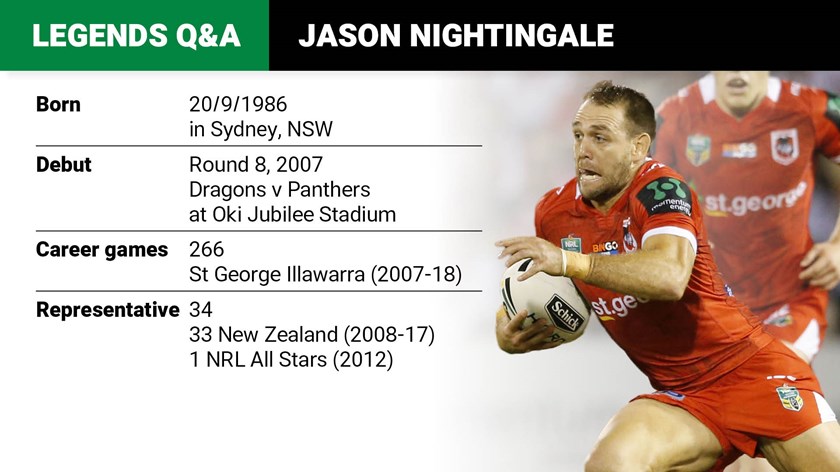
Players like that really gave you something to look up to and being part of that St George Junior League community was definitely a big driver in wanting to get to junior reps and eventually the top squad.
You debuted in 2007 against Penrith at Jubilee Oval in a 28-16 win. What do you remember?
A dropped ball [with my] first touch was very memorable. Dropped ball second touch was also memorable. And then I had a couple of runs and I scored not long after that and all was forgotten - in my own head, anyway. I thought I was king.
From there, it was pretty good to settle the nerves and have a few runs. I loved every minute of it. I obviously played a lot of games at Kogarah as a junior, but seeing it packed to watch you run around and play the game you love is very special.
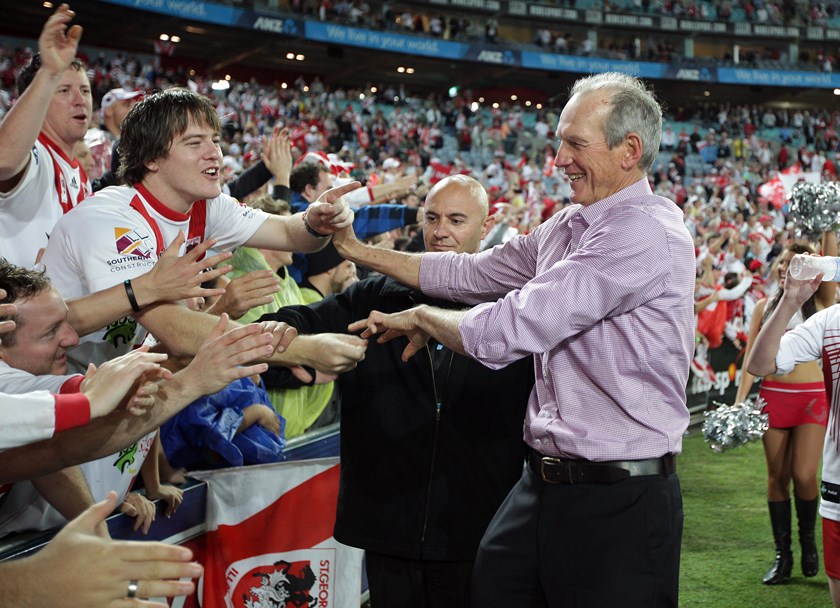
When Wayne Bennett arrived as coach in 2009 you often had to play off the bench, with Wendell Sailor and Brett Morris on the wings. Was that tough to take?
Not really. I was only 21 and I think part of what helped me get through my career was being quite grateful for everything. I think the fact that I was an 88-kilo winger coming off the bench, it just showed a lot about what Wayne thought about me and what his plans were.
He [wouldn't] put people on the bench who would look useless there on paper unless he believed in them and wanted them part of the team. I had about eight games off the bench and played all sorts of different positions. I remember going on tour in 2009 with the Kiwis and just reflecting on the year and what I'd learned.
Wendell retired before the 2010 season, you regained your starting wing spot, and the Dragons won the premiership. Was it the pinnacle of your career?
Yeah, it was. That was a great year and everything fell into place on the back of getting knocked out in straight sets in the semi-finals the year before when we finished first. We were a lot more confident, a lot more mature in 2010, and for me personally, I felt the same.
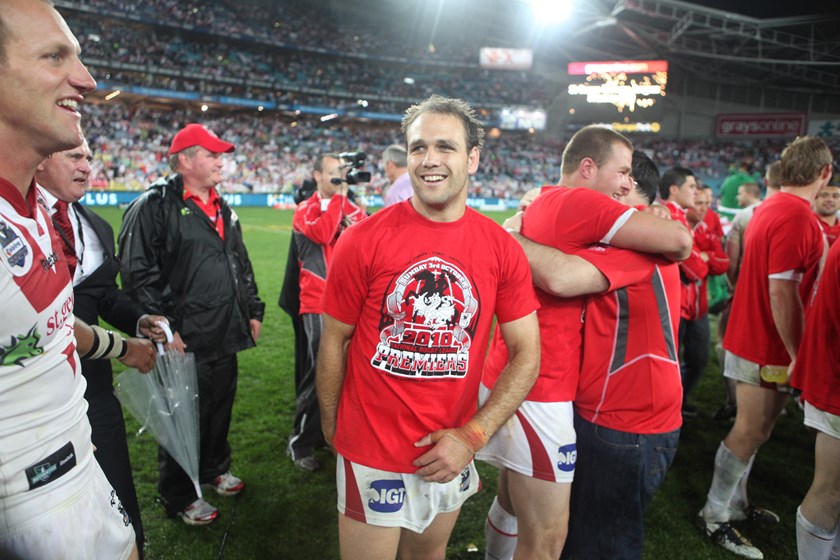
The Roosters led 8-6 at half-time in the 2010 decider and the Dragons won 32-8. Your quickfire double after the break wrested back control. Is that when you knew the match was won?
It was the momentum that you feel in any sport you play. It's that feeling, that energy, that if you knew how to turn it on you'd do it every week and never lose a game. We'd hit that level.
It was the culmination of a lot of hard work, but once we hit that and stayed a bit more patient like we had in the semi-final before that, we had a lot of belief and confidence that translated on the field.
When we scored that second try, I certainly felt it and I think everyone else felt that we weren't going to lose the game from there. Every try after that was just a celebration and confirmation that we'd earned what we were going to achieve.
Certainly, the most enjoyable 20 minutes of my career was playing that last quarter knowing we weren't going to lose and you could just enjoy playing the game that you always enjoyed playing.
After Wayne Bennett left at the end of 2011 there were some lean years as guys like Darius Boyd, Jeremy Smith, Jamie Soward and Brett Morris changed teams. Was leaving ever an option for you?
After I signed my first three-year contract when I was 20 or 21, I had a little goal; not to be closing the door on anything else; but just to go, OK, how do I work hard so this club wants to keep me?
And then building the relationship to be reciprocal [so] they've got reasons to want to re-sign me and I've got reasons to want to re-sign so I keep enjoying my footy.
The lifestyle was a big part of it. Living in Sydney around my friends and family and becoming so comfortable and in tune to that, it's the sort of thing that creates routines.
Still, you have to look at your options in today's game. It's been like that for the last 20 years. I was always open to offers but never really went to market, which is a credit to my club to not make me.
It looks like you may be using adblocking software to view this site.
Many features on the site, such as video playback, may not work properly when using adblocking software.
Please whitelist our domain or disable your adblocker to access all features and videos.
Nightingale's 250th
You scored many spectacular tries throughout your career. Does one stick out?
[There was one] in an old England-New Zealand game where I jumped on my head. That's memorable now because I got reminded about it by James Graham recently. I was like, 'Do you remember this game?' and he was like, 'No, not really,' and I was like, 'I don't really either, but I remember that try.'
And obviously the second try in the grand final, for what it meant to our club. The ones that mean a lot to the team are the ones that mean a lot personally because the reason you play the game is to win and having memorable tries attached to that makes you feel a bit better.
Other ones are where we've won games or when we've been dominant and able to be a bit more flamboyant. The tries that I scored off the back of some flamboyant plays - it's always enjoyable as a winger when you can show off a bit, I suppose.
Phil Gould often endearingly spoke about your 'awkward' style in Channel Nine's commentary. What did you make of that?
It can look ungainly and awkward - and it is - but in most ways it's been used to my advantage. I'm as straight up and down as I look on face value - 90 kilos, reasonably quick but not electric and not a huge step. You have to have some X-factor.
I suppose mine was the awkward ungainliness and probably being stronger than I looked. I definitely used the fact I wasn't sure what I was doing to my advantage. Having a level of unpredictability in my own head allowed me to put that in my opponent's head.
You were in New Zealand's historic 2008 World Cup-winning squad and played in the 2010 Four Nations final win against Australia. What are your Test highlights?
That 2008 squad was pretty awesome. I learned a lot about winning that year. We hadn't had that success at the Dragons - we got knocked out of the finals first week to the eventual premiers [Manly].
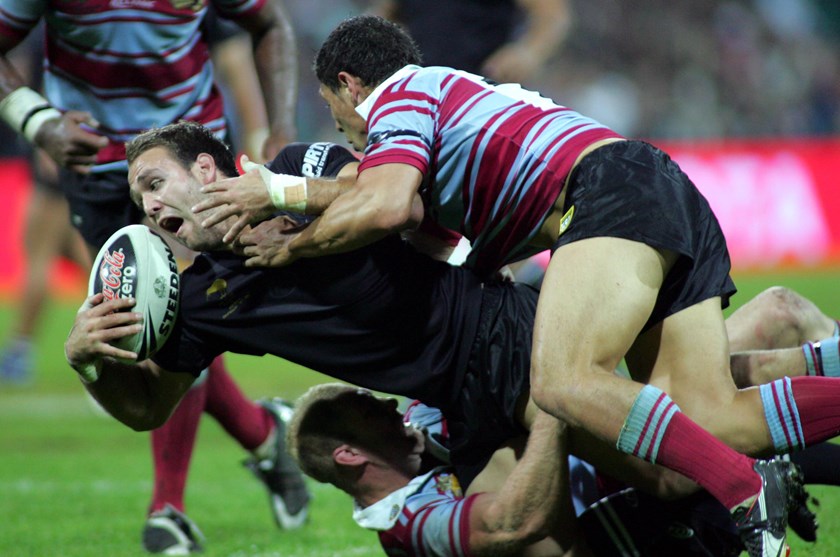
Being underdogs, the lessons I took from that personally and the confidence it gave our nation in rugby league was pretty awesome.
It was just awesome in '10 to come back the way we did - we got toweled up by Australia in New Zealand the week before.
In 2014, there was a [Four Nations] series we went through undefeated and we were very dominant. Australia almost snuck over in the final but the whole tour was flawless.
I couldn't fault anything that happened as far as our schedule, our camaraderie, the way we bonded, the way we played footy. It was pretty epic.
And then my final tour of England I really enjoyed. I don't think we were successful but I had a lot of fun. Those memories that are off the field are just as special, especially tour life.
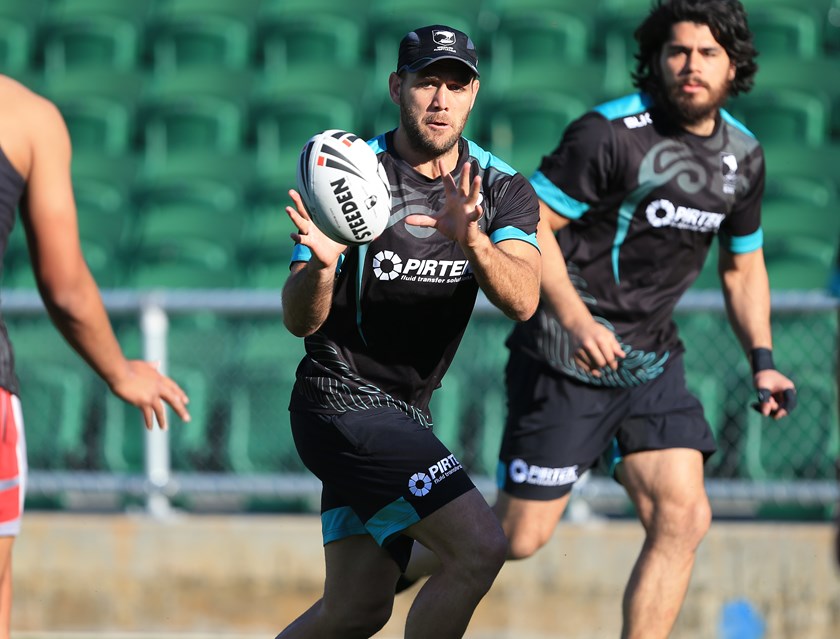
And what about the 'Happy Haka' meme that spawned when you looked to be smiling in the Haka before a Test?
It's funny, I was in my Dragons office the other day and a girl who works for us goes, 'Did they make you do the Haka?' I was like, 'Google it.' Obviously, it's the first thing that comes up and she was losing it.
The meme still holds true today and when people ask me I just say, 'Check how good I was!' From then, it was pretty much about redeeming myself the whole time. I think I almost led or was up the front for one of the Hakas.
You retired from the NRL relatively young at 31. Why was the timing right?
I spent a lot of time, preparation, learning, going to uni - I never finished anything - but getting that experience. We started our Elite Athlete Business School in 2015, so I had that going for three or four years. It was the right time for lifestyle; my wife works full-time and sport is a very selfish career and needs to be.
The Dragons offered me a one-year deal [for 2019] which wasn't that much money - obviously, I was getting older - but I started to think, 'This will be my last year and what else can I do?' As soon as I started thinking like that, it's like, 'You should retire, mate.'
If you're starting to think, okay, cool, we'll do this one-year deal because it's good money relative to the real world and you can do X, Y, Z as well, that's not how it works. Even though I started a business while I was in footy, footy was always number one.
To be able to let something else in, being your wife's career or another career, you can't compete at NRL level.
It looks like you may be using adblocking software to view this site.
Many features on the site, such as video playback, may not work properly when using adblocking software.
Please whitelist our domain or disable your adblocker to access all features and videos.
Nightingale’s life after footy
You're now a successful business owner, having set up the Elite Athlete Business School and Flow Espresso cafe in Kogarah, as well as being a Dragons ambassador. How do you juggle it all?
It's a scheduling challenge, for sure. That took me a lot of months to learn because it is a bit of a balance. It's about prioritising - and we do teach about priority managing - and making sure you do manage your own personal development so you don't get too bogged down.
The cafe gave me routine as far as the early starts and things to get done. It's really fun. If I'm travelling too much for EABS or some Dragons stuff, I miss it. I feel like it's good for my lifestyle ... Making coffee for four hours, using my words and talking shit to people really, it's a good way to start the day.
Then the business school is much more mental, learning things all the time, there are moving parts. Scheduling, because we've got athletes and corporates, is probably the hardest part.


